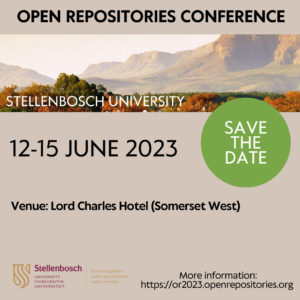Nominations are open for new ORSC members (2024-2027)
The Open Repositories Steering Committee (ORSC) is pleased to announce that it is seeking nominations for new standing members.
ORSC manages the annual Open Repositories conference and typically consists of 12 standing members, as well as the chairs of the host and program committees for the annual conferences. Standing members serve a 3-year term with the option to renew for a second term. This year there are 2 open slots for new members who will begin their terms in Sep 2024.
We invite nominations (including self-nominations) through July 31, 2024.
To nominate yourself or someone else, complete the nomination form by 31 July 2024: https://forms.gle/CvtVLjqg7Xodtak57
ORSC membership criteria
Some type of experience with the Open Repositories conference is necessary to join the ORSC. Well-qualified candidates have:
- Participated in at least 1 previous OR conference as an attendee
- Participated in the program or host committee of at least 1 previous OR conference
- Extensive experience with repositories and the international repository community
ORSC member responsibilities
ORSC members are expected to actively participate in a range of activities throughout the year, as well as those specifically related to the conference (typically held in early June).
Member responsibilities include:
- Regular attendance at monthly ORSC meetings (online, currently alternating between 3:30p UTC and 5:30p UTC)
- Regular attendance at OR, if possible. We note that for some potential members this can be difficult due to cost, travel, and schedules; the ORSC cannot provide funding for members to attend.
- Reviewing conference proposals and submissions (Jan-Feb each year)
- Serving on ad hoc or standing committees (e.g. Fellowships, Code of Conduct, Finance, etc.)
- Serving specific conference roles such as session moderators or track chairs.
- Sharing OR news and announcements (e.g. Calls for Papers, Expressions of Interest) via mailing lists and social media
- Reviewing conference host bids.
- Selecting new standing members for the ORSC
- Timely participation in all discussions, in-person and online
Potential nominees should review the conference handbook for more information about the role of the ORSC: https://wiki.lyrasis.org/display/or11/Open+Repositories+Conference+Handbook. See https://wiki.lyrasis.org/display/or11/Membership+Policy for our membership policy. Current members are listed at https://www.openrepositories.org/steering-committee/.
Submitting a nomination
Nominations should be submitted via the nomination form: https://forms.gle/CvtVLjqg7Xodtak57 . When submitting a nomination, the following information is required:
- Personal information: name, email, institution affiliation, and a brief description of the nominee’s role at their institution
- OR experience information: description of participation in OR conferences within the past 4 years
- Statement of interest: why the nominee wants to join the Steering Committee.
- Statement of qualifications: what specific experiences the nominee would bring to the Steering Committee
Timeline
- The nomination deadline is July 31, 2024.
- The OR Steering Committee will elect new members in August 2024
- Successful new members will be expected to join the ORSC in September 2024 for a three-year period.
Any questions
If you have questions about the ORSC, please feel free to contact the Chair, Torsten Reimer, at reimer@uchicago.edu or the Vice-Chair, Liz Krznarich at liz.krznarich@datacite.org

